
When it comes to feeding emus, the choice between organic and commercial feed is a crucial decision that can impact their overall well-being. The type of diet you choose for these unique birds can have far-reaching effects on their health, behavior, and longevity. By exploring the differences between organic and commercial options, you will gain valuable insights into what truly nourishes emus and promotes their vitality. Stay tuned as we unravel the complexities of feeding emus and uncover the best practices for their optimal care and nutrition.
Key Takeaways
- Organic feed offers higher quality nutrients for emu health.
- Long-term savings and market demand impact profitability.
- Organic feed production is more environmentally friendly.
- Proper nutrition supports immune function and vitality in emus.
- Consider toxin exposure and digestibility when choosing feed.
Nutritional Content Comparison
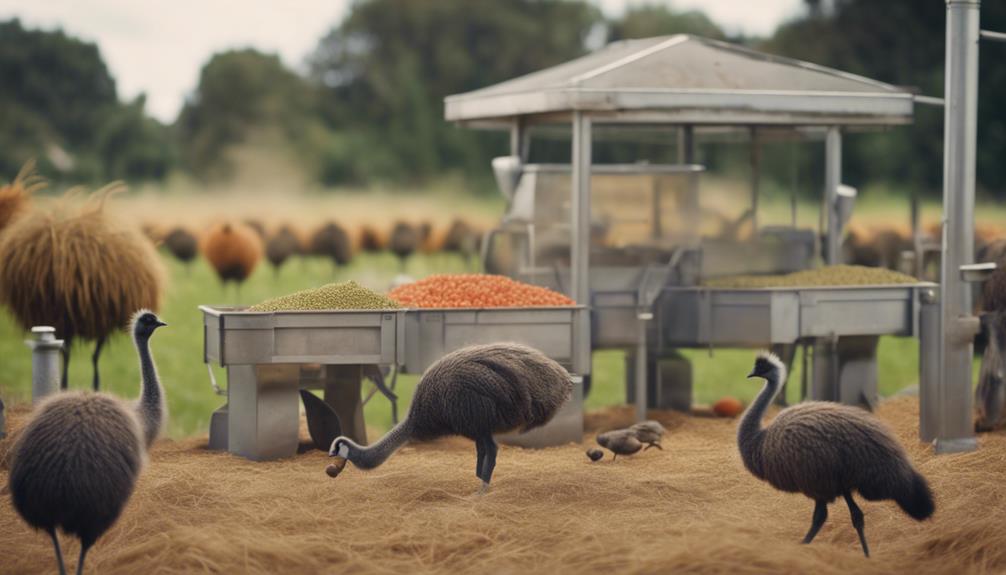
When comparing the nutritional content of organic and commercial feed for emus, it's essential to consider the specific dietary requirements of these unique birds. Emus are large flightless birds that require a balanced diet to maintain optimal health and performance. Organic feed, often made from natural ingredients without synthetic additives, can provide emus with essential nutrients such as protein, vitamins, and minerals. On the other hand, commercial feed, while convenient, may contain more fillers and additives that could potentially affect the overall nutritional value for these birds.
Emus need a diet rich in protein to support their growth and development. Organic feed options often offer a higher protein content sourced from quality sources like soybeans or fishmeal, which can benefit the emus' muscle development and overall health. Additionally, organic feed may contain higher levels of essential vitamins and minerals, crucial for sustaining the emus' energy levels and immune system.
Cost Analysis: Organic Vs. Commercial
To evaluate the economic implications of feeding emus with organic versus commercial feed, one must consider the financial aspects associated with each option. When comparing the cost analysis of organic feed versus commercial feed for emus, the following factors play a crucial role:
- Initial Investment: Organic feed typically comes at a higher price point initially compared to commercial feed due to the quality of ingredients used.
- Long-Term Savings: Despite the higher initial cost, organic feed may prove to be more cost-effective in the long run as it can contribute to better overall health in emus, potentially reducing veterinary expenses.
- Market Demand: The market demand for organic emu products may influence the profitability of raising emus with organic feed, as consumers are often willing to pay a premium for organic products.
- Feed Efficiency: Consider the feed conversion ratio of organic versus commercial feed to determine which option provides better efficiency in terms of converting feed into emu products.
Environmental Impact Considerations
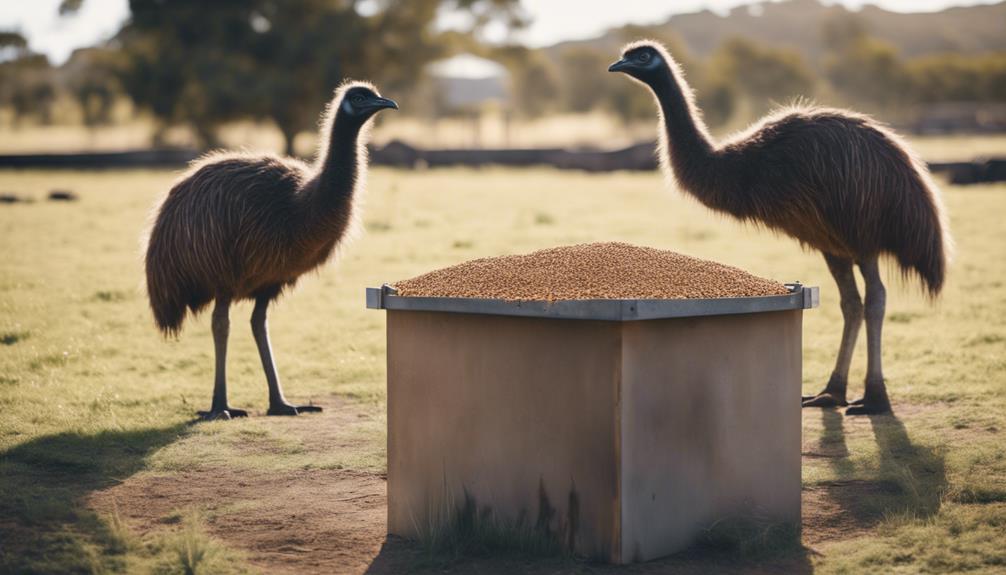
Considering the environmental impact of feeding emus with either organic or commercial feed is essential for sustainable farming practices. When evaluating the two options, organic feed generally has a lower environmental impact compared to commercial feed. Organic feed production tends to rely on more sustainable farming practices, such as crop rotation, reduced used of synthetic pesticides, and promoting biodiversity. These practices help to conserve soil health, reduce water contamination, and decrease greenhouse gas emissions. On the other hand, commercial feed production often involves intensive farming methods, leading to higher energy consumption, increased chemical usage, and habitat destruction. By choosing organic feed for your emus, you are not only promoting their health but also contributing to a more environmentally friendly farming system.
| Environmental Impact | Organic Feed | Commercial Feed |
|---|---|---|
| Soil Health | High | Low |
| Chemical Usage | Low | High |
| Biodiversity | Promotes | Reduces |
| Greenhouse Gas Emissions | Decreases | Increases |
Health Benefits for Emus
For optimal health and well-being, emus benefit significantly from a diet rich in essential nutrients and balanced proportions of proteins and fats. Emus, being large flightless birds, require specific dietary considerations to thrive and maintain their health. Here are four key health benefits that emus can experience from a well-rounded diet:
- Improved Immune Function: Emus consuming a diet high in essential nutrients such as vitamins A, E, and selenium are more likely to have a robust immune system, which helps in warding off infections and diseases.
- Healthy Skin and Feathers: A diet rich in proteins and healthy fats contributes to the development of strong skin and glossy feathers, which are essential for emus to regulate body temperature and protect themselves from environmental elements.
- Enhanced Reproductive Health: Proper nutrition plays a crucial role in the reproductive health of emus, ensuring optimal breeding conditions and successful hatching of eggs.
- Increased Energy Levels: Emus fed with a balanced diet experience higher energy levels, promoting overall activity and vitality in these majestic birds.
Taste and Preference Differences
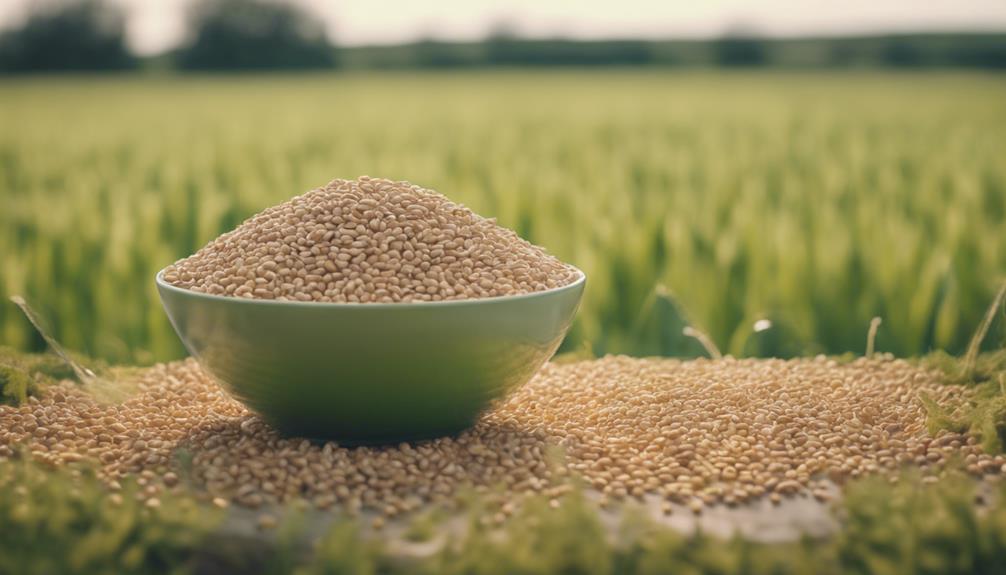
Emus exhibit notable variations in taste preferences, showcasing distinct inclinations towards certain food sources over others. Understanding these preferences is crucial for ensuring their optimal health and well-being. Below is a table outlining some common foods fed to emus and their taste preferences:
| Food Type | Emus' Preference | Notes |
|---|---|---|
| Fruits | Varied | Emus tend to enjoy fruits like melons, apples, and berries. |
| Vegetables | Selective | They show a preference for leafy greens like lettuce and spinach. |
| Insects | High | Emus have a natural inclination towards insects like crickets and mealworms. |
| Grains | Moderate | Grains such as oats and barley are generally accepted by emus. |
| Commercial Feed | Variable | Some emus may prefer commercial feed due to familiarity and convenience. |
Feeding Practices and Guidelines
When crafting feeding practices for emus, prioritize a balanced diet tailored to their nutritional needs and natural inclinations. Emus require a diet that mimics their natural foraging habits and provides essential nutrients for optimal health and growth. To achieve this, follow these guidelines:
- High-Quality Protein Sources: Include sources like insects, earthworms, and plant-based proteins to meet their protein requirements for muscle development and overall health.
- Fiber-Rich Vegetation: Offer a variety of leafy greens, fruits, and vegetables to ensure they receive an adequate amount of fiber for digestive health and nutrient absorption.
- Essential Fatty Acids: Incorporate sources of omega-3 and omega-6 fatty acids such as flaxseeds or fish oil to support their skin, coat, and overall well-being.
- Mineral Supplements: Provide access to mineral supplements or mineral-rich soil to fulfill their mineral needs, especially calcium and phosphorus, crucial for bone strength and eggshell formation.
Availability and Accessibility Factors
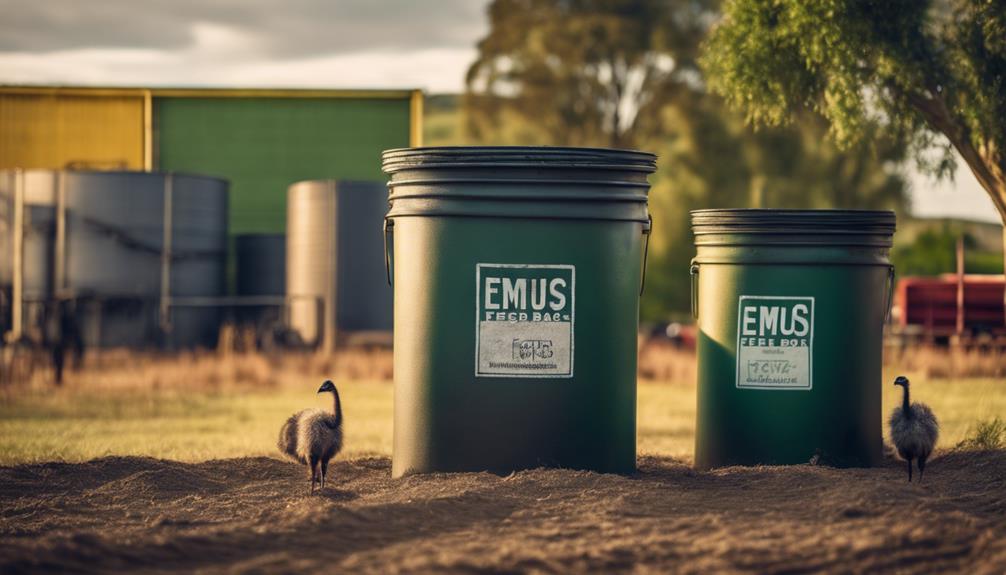
To ensure optimal feeding practices for emus, consider the factors of availability and accessibility when selecting their dietary components. Emus require a balanced diet rich in protein, vitamins, and minerals to support their growth and health. When choosing between organic and commercial feeds, availability plays a crucial role. Organic feeds may be limited in availability compared to commercial options, which are more readily accessible in the market.
Accessibility also influences the ease of obtaining the necessary feed for your emus. Commercial feeds are often conveniently packaged and widely distributed, making them easily accessible for emu owners. On the other hand, organic feeds may require more effort to source, potentially leading to challenges in consistently providing the desired diet for your emus.
Consider the availability and accessibility factors when deciding on the feeding regimen for your emus. Prioritize sourcing high-quality feeds that meet the nutritional requirements of these unique birds while considering practical aspects such as availability and accessibility.
Growth and Development Effects
Considering the impact on growth and development, the choice between organic and commercial feeds for emus can significantly influence their overall well-being. Emus require a balanced diet to support their growth and development adequately.
Here are four key factors to consider when evaluating the effects of organic versus commercial feeds on emus:
- Nutrient Density: Organic feeds often contain higher levels of essential nutrients, promoting healthier growth rates and overall development in emus.
- Toxin Exposure: Commercial feeds may contain additives or pesticides that could hinder growth and development, whereas organic feeds minimize exposure to harmful substances.
- Digestibility: Organic feeds are generally easier for emus to digest, allowing for better absorption of nutrients critical for growth and development.
- Long-Term Health: Emus fed organic diets tend to exhibit improved long-term health outcomes, including stronger immune systems and enhanced overall well-being.
Digestibility and Absorption Rates
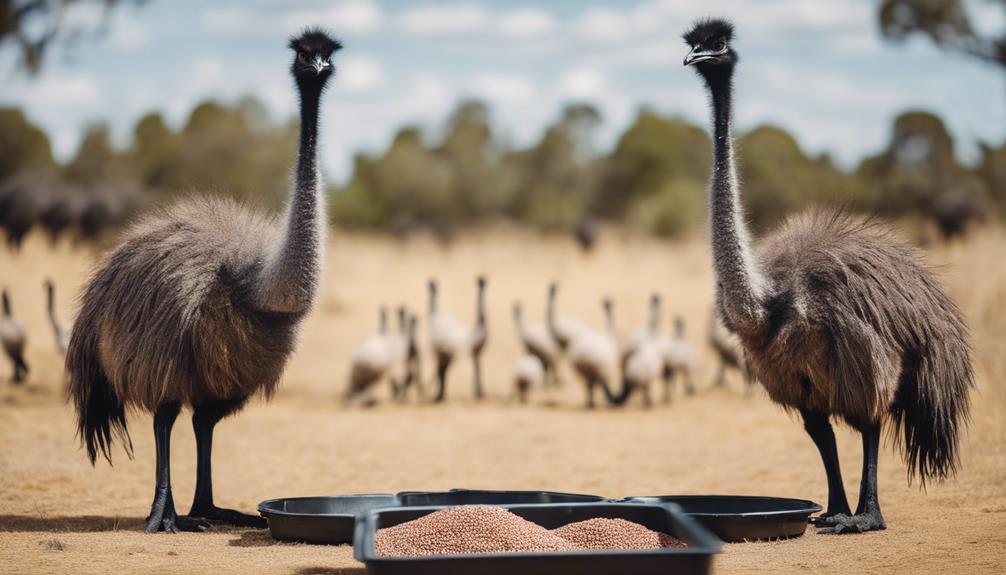
Enhancing the digestibility and absorption rates of feeds is crucial in optimizing the growth and development of emus. Emus, as highly efficient feed converters, require a diet that can be easily broken down and absorbed to support their rapid growth.
The digestibility of organic feeds is often higher than that of commercial feeds due to the absence of synthetic additives and the presence of natural enzymes that aid in digestion. Organic feeds offer a more bioavailable nutrient profile, leading to better absorption rates in emus.
Research indicates that emus fed organic diets show improved nutrient utilization and growth performance compared to those on commercial feeds. Organic feeds, being free from pesticides and genetically modified organisms, promote a healthier gut environment in emus, further enhancing their digestibility and absorption rates.
Potential Risks and Contaminants
When assessing potential risks and contaminants in emu feeding, it's essential to consider the sources and impact on overall health and performance. Emus, like all animals, are susceptible to various risks and contaminants that can affect their well-being. Here are four crucial points to consider:
- Pesticide Exposure: Emus consuming feed treated with pesticides may suffer from toxicity, impacting their health and productivity.
- Mycotoxins: Contaminated feed can contain mycotoxins, leading to digestive issues and reduced immune function in emus.
- Heavy Metals: Feeding emus with contaminated grains or water containing heavy metals can result in long-term health issues and decreased performance.
- Microbial Contamination: Poor quality feed or unclean feeding environments can expose emus to harmful bacteria or fungi, causing infections and digestive disturbances.
Understanding and mitigating these risks through proper monitoring and sourcing of feed are crucial for maintaining the health and productivity of emus in both organic and commercial feeding systems.
Long-Term Health Implications
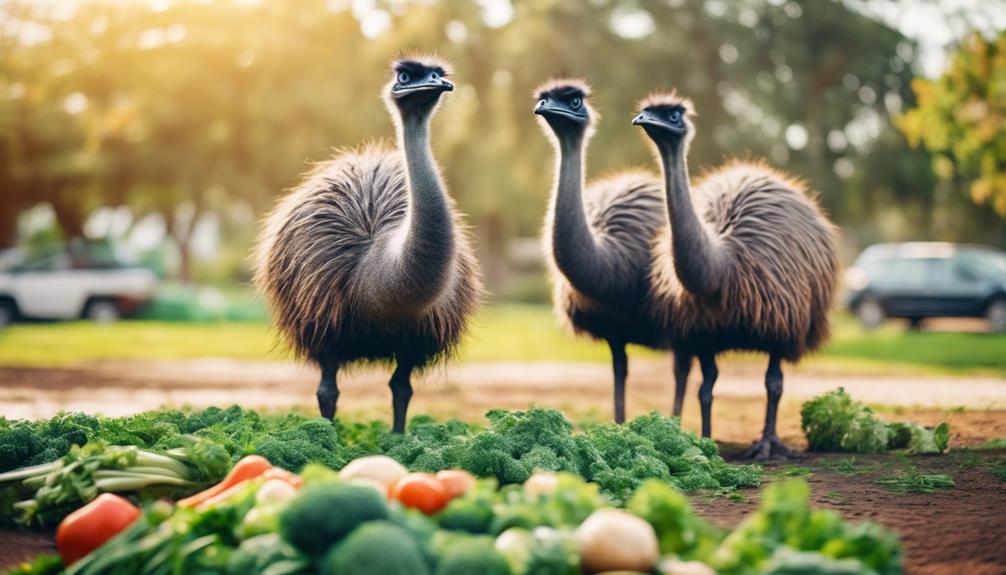
Long-term health implications for emus can be significantly influenced by the quality and composition of their feed over time. When considering the feeding regimen for emus, it's crucial to prioritize their long-term health. Organic feed, known for its high-quality ingredients and minimal processing, can contribute positively to the overall health of emus. Research suggests that organic feed may reduce the risk of health issues such as obesity, digestive disorders, and certain diseases in emus compared to commercial feed options. Additionally, organic feed often contains higher levels of essential nutrients, which can enhance the immune system and promote better overall health in emus over the long term.
Conversely, commercial feed, while convenient, may contain additives and lower-quality ingredients that could potentially lead to health complications in emus over time. High levels of preservatives, artificial colors, and fillers in commercial feed may negatively impact the digestive system and overall well-being of emus, potentially resulting in long-term health issues. Therefore, choosing the right feed for emus is paramount in ensuring their long-term health and well-being.
Personalized Feeding Recommendations
For optimal health and nutrition outcomes for emus, tailored feeding recommendations based on individual needs and conditions are essential. To ensure your emus thrive, consider the following personalized feeding recommendations:
- Assess Body Condition: Regularly evaluate your emus' body condition to adjust their feeding regimen accordingly. Emus should have a firm muscle cover over their breastbone and ribs, indicating a healthy weight.
- Consider Age and Activity Level: Young emus and breeding adults have different nutritional requirements. Adjust feed quantities and composition based on the age and activity level of your emus.
- Monitor Health Indicators: Keep a close eye on your emus' overall health. Changes in appetite, droppings consistency, or feather quality can signal the need for dietary adjustments.
- Consult with Avian Nutrition Experts: When in doubt, seek advice from professionals specializing in avian nutrition. They can provide tailored guidance to meet your emus' specific dietary needs.
Frequently Asked Questions
Can Emus Be Fed a Combination of Organic and Commercial Feed?
Yes, emus can be fed a combination of organic and commercial feed. This practice allows for a balanced diet that meets their nutritional needs effectively. Ensure proper proportions and quality to optimize their health and development.
Are There Any Ethical Considerations When Choosing Between Organic and Commercial Feed?
When choosing between organic and commercial feed for your emus, ethical considerations revolve around sustainability, animal welfare, and environmental impact. Make an informed decision that aligns with your values and supports the well-being of your animals.
How Do Different Feeding Methods Impact Emu Behavior and Social Interactions?
To understand how different feeding methods impact emu behavior and social interactions, observe their responses to varied diets. Note shifts in flock dynamics, aggression levels, and overall temperament. Research-backed data can illuminate the nuances of emu feeding practices.
Are There Any Regulations or Certifications for Organic Emu Feed?
When it comes to regulations and certifications for organic emu feed, you must ensure adherence to specific standards and guidelines to guarantee quality and authenticity. Certification bodies set strict criteria for organic feed production.
Can Feeding Emus a Varied Diet Improve Their Overall Health and Well-Being?
Diversifying an emu's diet can enhance their overall health and wellbeing by providing a range of essential nutrients. Imagine a symphony of well-being with a varied diet as the conductor orchestrating optimal health for your emus.
Conclusion
In the realm of feeding emus, opting for organic feed over commercial feed is akin to choosing a lush, vibrant garden over a sterile, artificial landscape.
The nutrient-rich ingredients in organic feed provide a foundation for optimal health and vitality, ensuring that your emus thrive and flourish.
Make the conscious choice to prioritize quality over quantity, and watch as your feathered friends bask in the abundance of nature's goodness.




